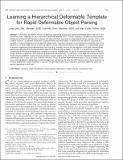Learning a Hierarchical Deformable Template for Rapid Deformable Object Parsing
Author(s)
Long, Zhu; Chen, Yuanhao; Yuille, Alan
DownloadZhu-2010-Learning a hierarchical deformable template for rapid deformable object.pdf (3.551Mb)
PUBLISHER_POLICY
Publisher Policy
Article is made available in accordance with the publisher's policy and may be subject to US copyright law. Please refer to the publisher's site for terms of use.
Terms of use
Metadata
Show full item recordAbstract
In this paper, we address the tasks of detecting, segmenting, parsing, and matching deformable objects. We use a novel probabilistic object model that we call a hierarchical deformable template (HDT). The HDT represents the object by state variables defined over a hierarchy (with typically five levels). The hierarchy is built recursively by composing elementary structures to form more complex structures. A probability distribution-a parameterized exponential model-is defined over the hierarchy to quantify the variability in shape and appearance of the object at multiple scales. To perform inference-to estimate the most probable states of the hierarchy for an input image-we use a bottom-up algorithm called compositional inference. This algorithm is an approximate version of dynamic programming where approximations are made (e.g., pruning) to ensure that the algorithm is fast while maintaining high performance. We adapt the structure-perceptron algorithm to estimate the parameters of the HDT in a discriminative manner (simultaneously estimating the appearance and shape parameters). More precisely, we specify an exponential distribution for the HDT using a dictionary of potentials, which capture the appearance and shape cues. This dictionary can be large and so does not require handcrafting the potentials. Instead, structure-perceptron assigns weights to the potentials so that less important potentials receive small weights (this is like a ?soft? form of feature selection). Finally, we provide experimental evaluation of HDTs on different visual tasks, including detection, segmentation, matching (alignment), and parsing. We show that HDTs achieve state-of-the-art performance for these different tasks when evaluated on data sets with groundtruth (and when compared to alternative algorithms, which are typically specialized to each task).
Date issued
2010-06Department
Massachusetts Institute of Technology. Computer Science and Artificial Intelligence LaboratoryJournal
IEEE transactions on pattern analysis and machine intelligence
Publisher
Institute of Electrical and Electronics Engineers
Citation
Long Zhu, Yuanhao Chen, and A. Yuille. “Learning a Hierarchical Deformable Template for Rapid Deformable Object Parsing.” Pattern Analysis and Machine Intelligence, IEEE Transactions on 32.6 (2010): 1029-1043. © 2010, IEEE
Version: Final published version
Other identifiers
INSPEC Accession Number: 11256708
ISSN
0162-8828
Keywords
Hierarchy, Object parsing, Segmentation, Shape matching, Shape representation, Structured learning